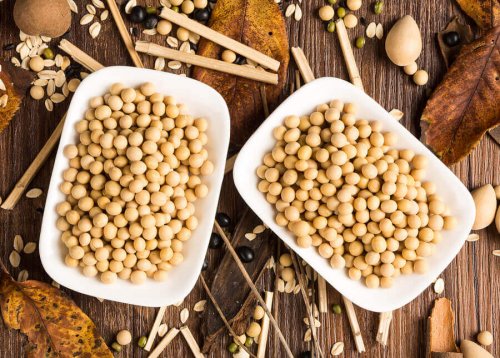Three Complementary Treatments for Hypothyroidism

Are you looking for treatments for hypothyroidism? Often, many of us are looking for simple and natural remedies to improve our quality of life and complement medical treatment.
In this article, we’d like to offer you some options. They’ll do wonders for your wellbeing. This is because they’ll help you manage bothersome symptoms such as tiredness, hair loss, insomnia, and even constipation.
Treatments for Hypothyroidism
The thyroid gland is essential for a person’s health. This is because it produces hormones that regulate our metabolism. Plus, they intervene in many of the numerous functions of our body. Thus, the symptoms of hypothyroidism often impact our health in various ways.
Hypothyroidism occurs when the thyroid is slow. Therefore, it fails to produce enough hormones. In order to diagnose this problem, a doctor will perform blood tests to try to find out our levels of thyroxine (T4) and thyrotropin (TSH). As with everything, there are different opinions as to which range is problematic. In some cases, any altered levels may return to normal after a while. Therefore, the doctor will always rely on the blood tests, but also on any symptoms. From there, if they consider it appropriate, they’ll prescribe medication containing the thyroid hormone so as to replace the deficit.
In addition to always following medical guidance and their relevant controls, these are proven remedies for hypothyroidism that will be useful as a complement to your drug treatment. Also, they’re good preventive measures if you have a natural predisposition to this kind of disease.
Read also Use Rhubarb to Naturally Improve the Health of Your Thyroid
1. Treatments for Hypothyroidism: A daily dose of selenium

In most adults, selenium accumulates mainly in the thyroid. This gland needs it to properly metabolize hormones and also has antioxidant properties. From a proven scientific point of view, in the case of autoimmune hypothyroidism (Hashimoto’s disease), this mineral is related to:
- A reduction in antibody levels.
- An improvement of the thyroid at an ultrasound level.
- Also, a better quality of life.
- A delay in ocular deterioration, if Graves’ orbitopathy is present.
Many studies suggest taking organic selenium. However, don’t take this supplement without medical supervision, as it could cause damage if you take too much of it. Instead, a good alternative is to add Brazil nuts to your diet. If you only consume two a day, you’ll have the amount of selenium your body needs without risking your health.
2. Treatments for Hypothyroidism: Maca Supplement
Maca is a root originally from Peru that’s a part of most people’s diets in South America. However, its powder is now part of supplements worldwide because it’s an energy booster and also regulates hormones.
Particularly, yellow maca is highly effective in thyroid disorders, especially during menopause. In addition, this root may also provide you with enough energy to deal with fatigue, a frequent symptom of hypothyroidism.
To take maca as a supplement, just follow the indications and doses on the label of a product. Keep in mind that it’ll stimulate you, so start with a low dose and increase it progressively under the supervision of your doctor.
3. Beware of iodine blockers

To complement any remedies for hypothyroidism, you must not only get nutrients. You must also take into account the foods that could possibly harm you and that you may already be consuming daily. There are certain foods that are only harmful to people with an underactive thyroid. This is because they contain substances called goitrogens and these inhibit the absorption of iodine, which is quite essential for good thyroid health.
The foods to avoid are:
- Soy and its derivatives (tofu, Tempe, lecithin, etc)
- Millet
- Cruciferous vegetables such as broccoli, cauliflower, cabbage, cabbage, radish, and turnips
- Pine nuts, almonds, and peanuts
- Strawberries, pears, and peaches
- Cassava and sweet potato
- Mustard
- Spinach
- Flaxseed
However, make sure to ask your doctor if you have any questions.
Overall, you’ll see how if you follow this advice regarding treatments for hypothyroidism, you’ll enhance your medical treatment and notice much improvement in your normal day-to-day activity. Therefore, make small changes in your diet and make sure to keep up your medical treatment.
All cited sources were thoroughly reviewed by our team to ensure their quality, reliability, currency, and validity. The bibliography of this article was considered reliable and of academic or scientific accuracy.
- Thomson, C. D., Chisholm, A., McLachlan, S. K., & Campbell, J. M. (2008). Brazil nuts: An effective way to improve selenium status. American Journal of Clinical Nutrition. https://doi.org/10.1093/ajcn/87.2.379
- Chandra, A. K. (2010). Goitrogen in food: Cyanogenic and flavonoids containing plant foods in the development of goiter. In Bioactive Foods in Promoting Health. https://doi.org/10.1016/B978-0-12-374628-3.00042-6
- Meissner, H. O., Mscisz, A., Mrozikiewicz, M., Baraniak, M., Mielcarek, S., Kedzia, B., … Pisulewski, P. (2015). Peruvian Maca (Lepidium peruvianum): (I) phytochemical and genetic differences in three Maca phenotypes. International Journal of Biomedical Science.
This text is provided for informational purposes only and does not replace consultation with a professional. If in doubt, consult your specialist.








